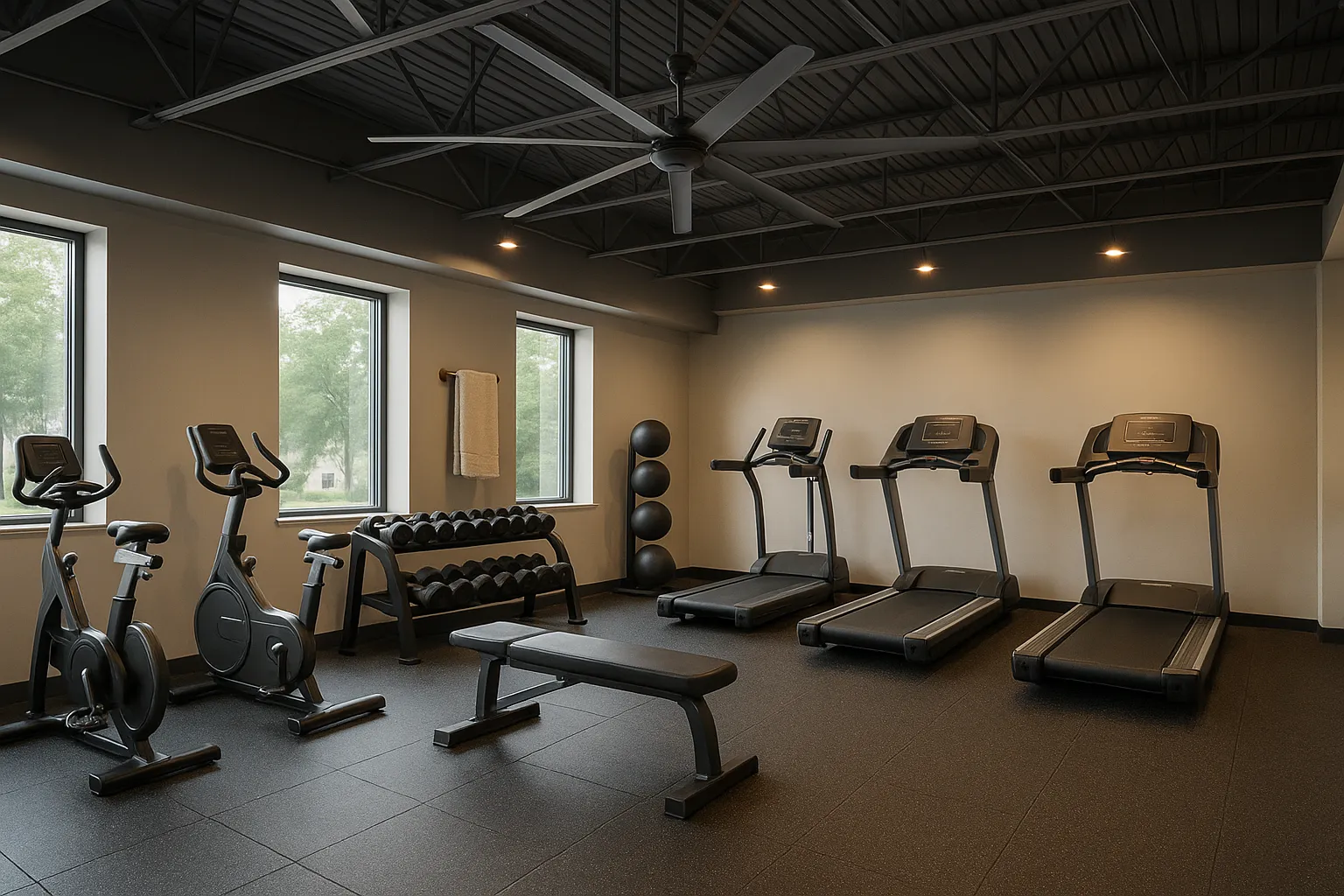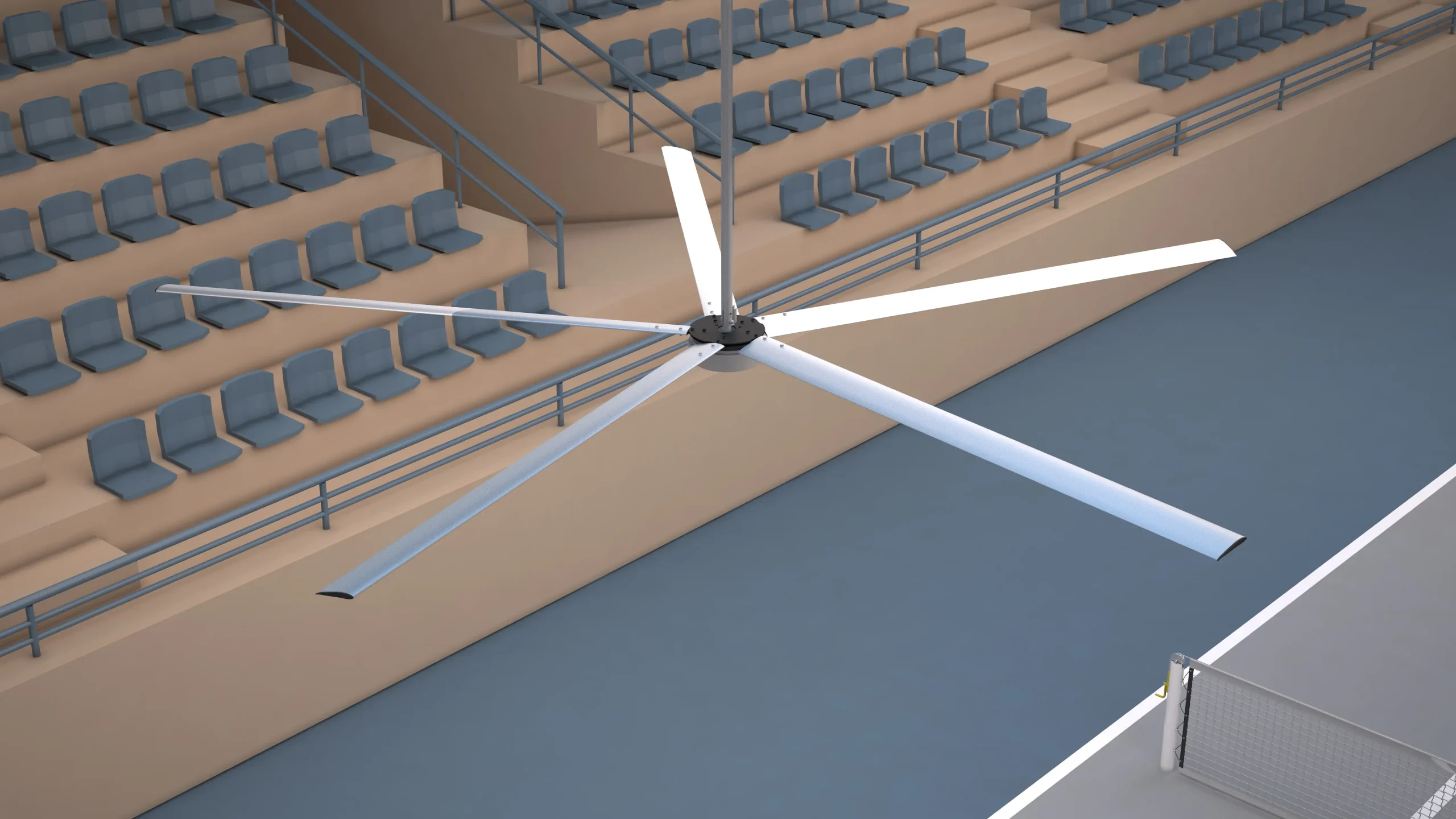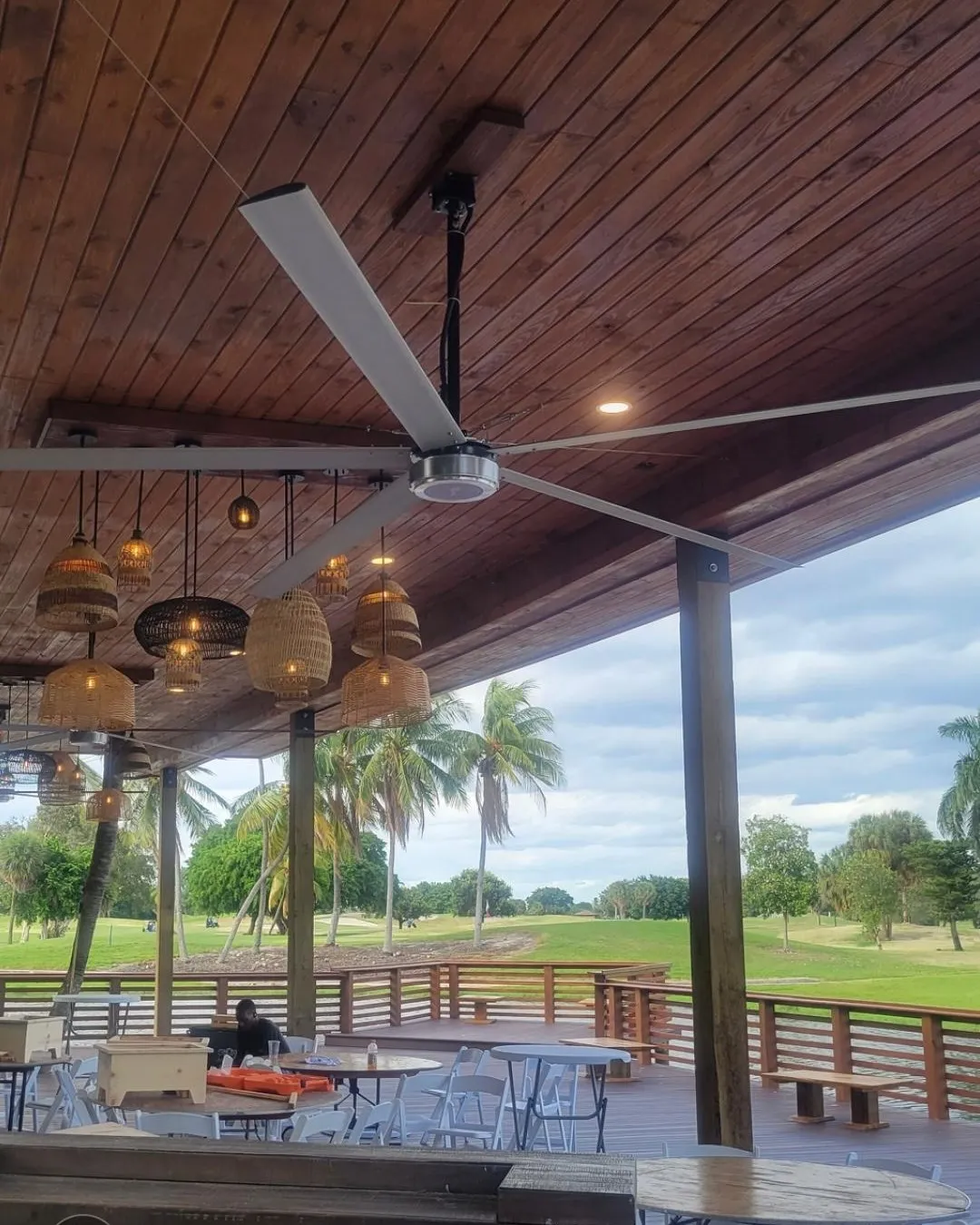Sweltering summers, frigid winters, and stagnant air sabotage comfort in warehouses, gyms, and factories. Uneven temperatures inflate energy bills and drain morale. HVLS-Deckenventilatoren wipe out these uncomfortable conditions—gently balancing heat layers, cutting costs, and elevating productivity.
Big industrial ceiling fans—high‑volume, low‑speed (HVLS) fans—move massive amounts of air at gentle speeds. Stretching up to 24 ft, one fan balances hot and cold layers across 20 000 sq ft, trimming HVAC runtimes 20–40 % and delivering uniform comfort in industrial and commercial spaces.
Before diving into specs, let’s clarify why the Industrie und Gewerbe world calls these giants “HVLS.”
High‑Volume, Low‑Speed (HVLS) units rotate at just 50–90 RPM, yet their heavy‑duty aluminum or composite Lüfterflügel stretch 8–24 ft. That scale produces a wide, slow-moving column of air that spreads evenly before rising up walls—creating a continuous convection loop.
“One single HVLS fan can replace up to 20 traditional Bodenventilator oder drum fan units, freeing precious floor space and slashing maintenance.” — Field Test, Midwest HVAC Consultants
Quick comparison: The table below summarizes the essential design contrasts.
| Design Element | HVLS-Lüfter | Traditionell gewerblicher Ventilator |
|---|---|---|
| Spannweite der Klinge | 8–24 ft | 2–5 ft |
| Geschwindigkeit | < 90 RPM | > 300 RPM |
| Coverage per unit | Up to 20 000 sq ft | 400–600 sq ft |
| Typical noise | < 45 dB | 65 – 70 dB |
Those whisper‑quiet acoustics prove invaluable in hospitality halls and office spaces where low noise is mandatory.
Unlike box fans that blast a narrow jet, an HVLS fan produces a massive, slow “air plate” that circulates whole‑building air.
The resulting airflow pattern:
Because the loop covers ceiling‑to‑floor height, it lowers temperature and humidity extremes and discourages mold and mildew in barns, aircraft hangar bays, and distribution hubs.

hvls ceiling fan in fitness centers
To appreciate savings, you need context. The short note below sets the scene for the numbers that follow.
Intro to Table: The data compares annual electricity use before and after HVLS adoption.
| Art der Einrichtung | Sq Ft | Pre‑HVLS kWh / yr | Post‑HVLS kWh / yr | Significant energy savings |
|---|---|---|---|---|
| Lager – Phoenix | 120 000 | 870 000 | 560 000 | 36 % |
| Gym & Fitness Centers – Texas | 40 000 | 390 000 | 255 000 | 35 % |
| Aircraft Hangar – Ohio | 65 000 | 610 000 | 395 000 | 35 % |
Energy regulators count HVLS technology toward overall energy reduction credits, making the fans rebate‑eligible.
Read real‑world results on our hvls-Ventilatoren für das Lager Seite.
Selecting the right diameter isn’t guesswork; it’s about clearance, ceiling height, and desired CFM.
Rule of thumb: Tip clearance should exceed 2 ft from walls or racking to preserve laminar flow.
The chart illustrates the airflow difference between blade spans.
| Klingendurchmesser | Max CFM | Coverage (sq ft) |
|---|---|---|
| 14 ft | 85 000 | 9 000 |
| 20 ft | 168 000 | 18 000 |
| 24 ft | 210 000 | 22 000 |
“CFM” is cubic feet per minute. A 20 ft HVLS rated 168 000 CFM equals 15 pedestal fans—but draws under 1 kW.
Internal link: Explore our M650‑series hvls fans to see aerofoil options.
Facility managers often ask whether they can substitute spot coolers for HVLS units. This table spells out the trade‑offs.
| Criterion | HVLS destratification fans | Directional fans / spot coolers |
|---|---|---|
| Abdeckung | Whole‑building | Workstation |
| Geschwindigkeit | < 90 RPM, geringes Rauschen | 1 000–3 000 RPM |
| Am besten für | Temperature balance, Klimatisierung | Intense cooling |
| Energy draw | 0.8–1.5 kW (24 ft) | 0.25 kW each × quantity |
Fan solutions often combine both: HVLS for background equilibrium, directional kommerzielle Deckenventilatoren above weld bays or ovens.
Zitat
“Installing HVLS plus task fans cut our summer complaints to zero while trimming Energierechnungen 28 %.” — Facilities Manager, Ontario OEM
Proper mounting guarantees safety and performance; the bullets summarize must‑do checks.

event centers big industrial ceiling fans
Safety certifications further ensure reliability.
| Requirement | Standard |
|---|---|
| Motor | UL‑507 or IEC 60335 |
| Vibration | ISO 14694 |
| Hub design | Lock‑tight, anti‑drop |
| Optional mist kits | IP65 rating |
Internal link: Download CAD mounts from our industrielle Deckenventilatoren für die Fertigung resource center.
Modern HVLS fans aren’t just big blades—they’re IoT devices.
Internal link: API specs live on our großvolumige Ventilatoren mit niedriger Drehzahl für gewerbliche Seite.
Real‑life numbers validate the theory—here are two highlights.
Problem → 95 °F shop floor, 12 % defect spike
Solution → Four große industrielle Deckenventilatoren (20 ft)
Result → 6 °F drop, 9 % quality gain, 14‑month ROI, comfort and productivity soared.
Problem → Heat exhaustion in athletes
Solution → Three 24 ft units plus mist option
Result → 42 % fewer incidents, concession sales up 16 %.
Internal link: Explore more on our commercial ceiling fans for sports‑centers Seite.
The checklist below demystifies procurement for facility managers.
Ready for a quote? Reach out via our hvls Ventilatoren Hersteller Seite.

hvls outdoor ceiling fans
These answers tackle the queries we receive most from facility operators.
How many HVLS fans do I need for a 50 000 sq ft warehouse?
Generally two or three 20 ft units spaced 60 ft apart, adjusted for beams.
Do big ass fans® outperform other brands?
Big ass fans® sparked the category, but competitors now match specs; compare industrial grade efficiency and warranties.
Will HVLS fans curb mold in barns?
Kontinuierlich Luftbewegung dries bedding, reducing microbe growth.
Sind HVLS-Ventilatoren laut?
At < 45 dB—library level—they beat many Bodenventilator Einheiten.
Do HVLS fans interfere with sprinklers?
Installed per NFPA 13—3 ft below deflectors—they remain compliant.
Can HVLS fans run with radiant heating?
Yes. Reverse mode circulates roof heat downward, boosting system efficiency.
Before the bullets, a brief recap: HVLS technology delivers cost‑effective comfort across massive footprints.
Need tailored advice? Visit the große Industrieventilatoren für die Fertigung knowledge hub or schedule a free airflow audit now.

Hallo, ich bin Michael Danielsson, CEO von Vindus Fans, mit über 15 Jahren Erfahrung in der Ingenieur- und Designbranche. Ich bin hier, um mein Wissen weiterzugeben. Wenn Sie Fragen haben, können Sie mich jederzeit kontaktieren. Lassen Sie uns gemeinsam wachsen!